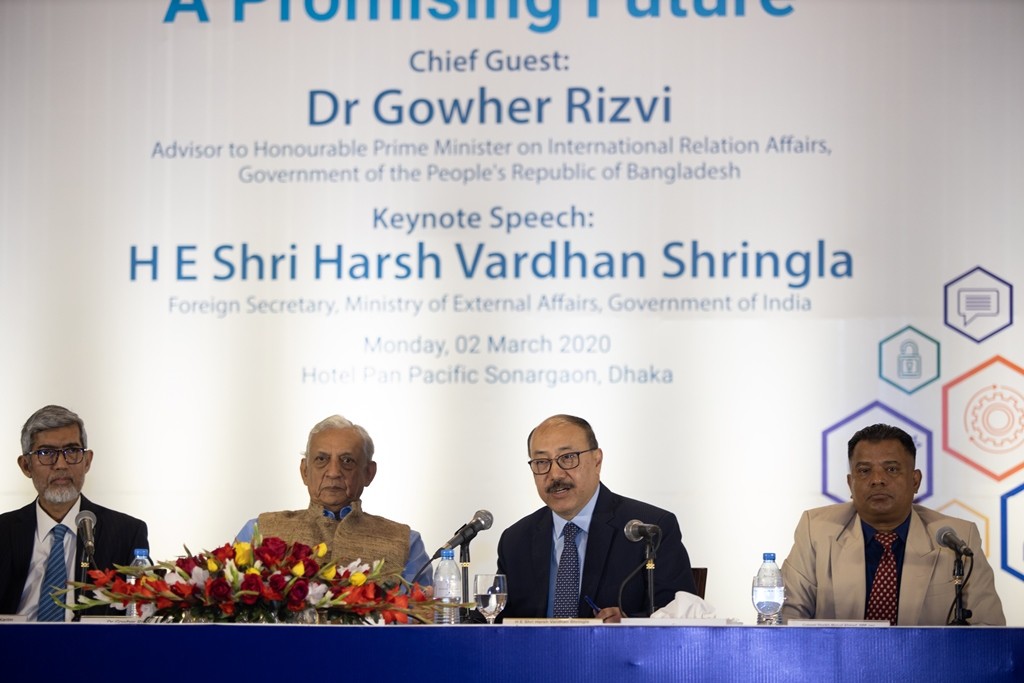Seminar on “Bangladesh and India: A Promising Future” 02 March 2020 at Hotel Pan Pacific Sonargaon, Dhaka
DATE: 2020-03-02
Bangladesh Institute of International and Strategic Studies (BIIISS) and the High Commission of India in Dhaka jointly organized a seminar titled “Bangladesh and India: A Promising Future” on 02 March 2020 at Hotel Pan Pacific Sonargaon, Dhaka. Dr Gowher Rizvi, Advisor to Honourable Prime Minister on International Relation Affairs, Government of the People’s Republic of Bangladesh, graced the seminar as the Chief Guest.
The Seminar was divided in two sessions. In the Inaugural Session, Colonel Sheikh Masud Ahmed, Acting Director General, BIISS delivered welcome address. H E Smt. Riva Ganguly Das, High Commissioner of India, Dhaka, Bangladesh made opening remarks. H E Shri Harsh Vardhan Shringla, Foreign Secretary, Ministry of External Affairs, Government of India, delivered the Keynote Speech. The keynote speech was followed by a lively open discussion. Ambassador M Fazlul Karim, Chairman, BIISS, chaired the Inaugural Session.
At the outset, the Chair of the Inaugural Session, Ambassador M Fazlul Karim, noted that the Father of the Nation Bangabandhu Sheikh Mujibur Rahman laid the foundation of close and cooperative ties with India and took immediate steps to resolve all outstanding issues between the two neighbours right after independence of Bangladesh. He added that the same spirit of cooperation of 1971 is guiding Bangladesh-India relation, as a result of which the two countries have been able to resolve many bilateral issues including the implementation of the historic land boundary agreement, sharing of water of the Ganges and maritime boundary demarcation.
In his welcome address, Colonel Sheikh Masud Ahmed, Acting Director General, BIISS said that in the context of changing global and regional dynamics, Bangladesh and India need to engage closely to chart out the future direction of their relations. He noted that recently Bangladesh-India cooperation has increased in the area of energy which can be a stepping stone for the regional electricity grid in South Asia. He stressed on finding new avenues for cooperation.
In her opening remarks H E Smt. Riva Ganguly Das, High Commissioner of India, Dhaka, Bangladesh said that the Indian Foreign Secretary, H E Shri Harsh Vardhan Shringla, chose Bangladesh as one of his first destinations to visit which indicates the importance of the relation between the two countries.
In the keynote speech H E Shri Harsh Vardhan Shringla, Foreign Secretary, Ministry of External Affairs, Government of India, said that the visit of Indian Prime Minister Narendra Modi in the inaugural ceremony of Mujib Barsho is of immense importance for India both because of the priority the Prime Minister attaches to this relationship, and even more so, because Bangabandhu is an iconic symbol of liberation for Bangladesh as well as for the subcontinent. He talked on several important issues like trade, transport connectivity through rail, road and waterways, people-to-people connectivity, water sharing, energy and security cooperation etc. He also touched upon the issues of National Register of Citizens (NRC) and the humanitarian crisis created in Rakhine state of Myanmar.
Dr Gowher Rizvi, Advisor to Bangladesh’s Honourable Prime Minister on International Relation Affairs, referred to the visit of Bangladesh’s Prime Minister Sheikh Hasina when it was decided that instead of talking about a single river at a time, there should be basin-wide settlements and agreements. He demonstrated his satisfaction as the process has resumed, and progresses are made but also mentioned that none of the countries is happy with the pace. He emphasized that in Bangladesh minorities are not only sacred but are also absolutely equal citizens. And, there is no question that their interest in a secular Bangladesh can be affected any way. He suggested that we need to take a fresh look and dream of articulating new visions regarding how far Bangladesh-India relations can go. He said that a number of agreements are supposed be signed during the visit of Indian Prime Minister but to him, it is more important to lay out a fresh vision. A roadmap was created in January 2010 which served its purpose well but the country needs to go beyond it, he emphasized.
The Inaugural Session was followed by a Working Session which was chaired by Dr. Mustafizur Rahman, Distinguished Fellow, CPD, Bangladesh. In the Working Session, Dr. Mahfuz Kabir, Research Director, BIISS, discussed the issue of Non-Tariff Barriers (NTBs) and Non-Tariff Measures (NTMs). He also talked about trade and investment issue. He proposed a 7-point agenda for strengthening Bangladesh-India ties which among others included attracting Indian investment to increase exports to Indian market, initiating a post-LDC trade strategy, identifying new export products, forming a high level committee to look into the NTM and NTB issues and making coastal shipping viable.
Mr. Sabyasachi Dutta, Executive Director, Asian Confluence, India talked about ecological, historical, cultural and knowledge connectivity between the two countries. He suggested Eco tourism and trade of agro products as a new avenue to increase connectivity as well as to reduce trade gap. He also emphasized on connecting entrepreneurs, stakeholders and policy makers at the ground level especially in the bordering districts.
Dr. Joyeeta Bhattacharjee, Senior Fellow, Observer Research Foundation (ORF), India talked about sub-regional initiatives of Bangladesh and India and emphasized that Bangladesh is in the centre of India’s neighbourhood policy.
Mr. Nahim Razzaq, MP, Member of the Parliamentary Standing Committee on Ministry of Foreign Affairs, Bangladesh stressed on transport and people-to-people connectivity to take Bangladesh-India relations forward. He also emphasized on exchange of information, trust building and investment by entrepreneurs of both sides. He called for investment by Bangladeshi business houses in India, especially in the India’s northeast states. He called for joint investment by Bangladesh and India in energy projects such as hydro electricity projects in Nepal. He also talked about security issue. The working session was followed by another vibrant open discussion.
Senior government officials of Bangladesh and India, present and former diplomats, representative of foreign missions and international agencies in Bangladesh, academia and experts, business community and media representatives participated in the seminar.








